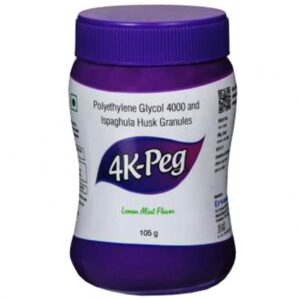POLYETHYLENE GLYCOL + ISABGOL HUSK GRANULES
Polyethylene Glycol: Polyethylene Glycol (PEG) is a drug commonly used as a laxative to treat constipation. It works by softening the stool and increasing water content in the intestines. PEG is available over-the-counter and by prescription, and it is often sold under brand names such as MiraLAX, GlycoLax, and RestoraLAX.
The mechanism of action of PEG is osmotic. When PEG is ingested, it is not absorbed by the body but instead remains in the intestines. It draws water into the colon, creating a softer and easier-to-pass stool. This promotes bowel movements and relieves constipation.
The dose of PEG can vary depending on the specific brand and formulation. It is usually taken orally as a powder that needs to be mixed with water or another beverage. The recommended dose is typically 17 grams of powder dissolved in 8 ounces of liquid, to be taken once daily. However, it is important to follow the instructions provided by a healthcare professional or the dosage information on the product packaging.
Side effects of PEG are generally mild and temporary. Common side effects include bloating, cramping, flatulence (gas), and diarrhea. These side effects usually subside as the body adjusts to the medication. However, if any severe or persistent side effects occur, it is important to consult a doctor.
While PEG is generally safe for short-term use, it is essential to consult a healthcare professional before using it for an extended period. People with certain medical conditions, such as bowel obstruction or a history of intestinal problems, should avoid using PEG without medical supervision.
Overall, PEG is an effective laxative used to treat constipation. Its osmotic action helps soften the stool and promote regular bowel movements, providing relief from constipation symptoms.
Isabgol Husk Granules: Isabgol Husk Granules is a medication that is commonly used as a dietary supplement for the treatment of constipation and to promote overall digestive health. It is made from the husks of the seeds of the Plantago ovata plant, also known as psyllium.
The mechanism of action of Isabgol Husk Granules is due to its high content of soluble fiber. When taken with water, it swells and forms a gelatinous mass in the intestines. This helps to soften the stool and increase its bulk, making it easier to pass through the digestive system.
The recommended dose of Isabgol Husk Granules is typically 1 to 2 teaspoons (approximately 5-10 grams) mixed with water, juice, or any other liquid, once or twice daily. It is important to follow the instructions provided by your healthcare provider or the product label.
Common side effects of Isabgol Husk Granules may include bloating, gas, stomach cramps, and diarrhea. These side effects are usually mild and transient. It is recommended to start with a low dose and gradually increase the amount to minimize these side effects.
Rarely, individuals may experience an allergic reaction to Isabgol Husk Granules, characterized by hives, difficulty breathing, or swelling of the face, lips, tongue, or throat. If any of these symptoms occur, immediate medical attention should be sought.
It is important to note that Isabgol Husk Granules should be used with caution in individuals who have a history of intestinal blockage, swallowing difficulties, or other gastrointestinal disorders. It is also important to drink plenty of fluids when taking this medication to prevent dehydration.
Overall, Isabgol Husk Granules are a safe and effective option for the treatment of constipation and to promote regular bowel movements. However, it is always advisable to consult with a healthcare professional before starting any new medication or supplement.

